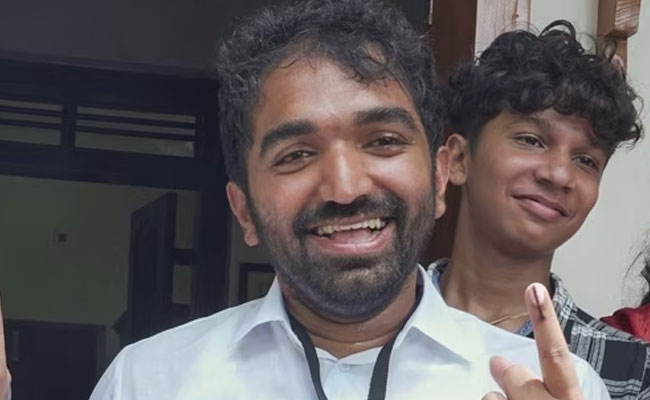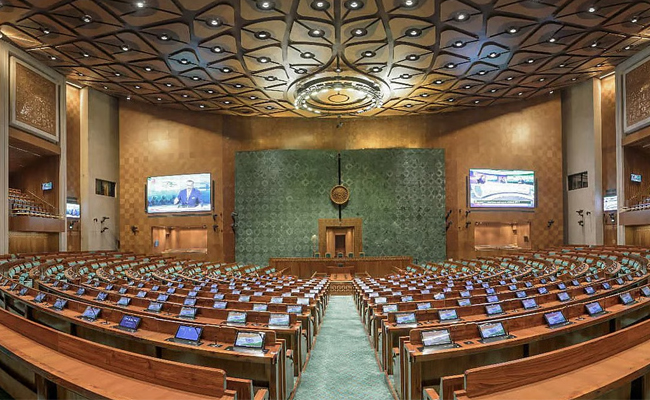Kottayam (Kerala) (PTI): Opposition Congress-UDF on Friday retained the Puthuppally Assembly constituency in Kerala as its candidate Chandy Oommen won by a margin of over 36,000 votes in the bypoll, Election Commission sources said.
The outcome of the election was a victory against LDF misrule and 100 per cent political victory for Congress, the party said in its response to Oommen's win.
While Oommen, son of late Congress stalwart Oommen Chandy, gained a clear edge since the initial round, his nearest rival and ruling LDF candidate Jaick C Thomas could never gain a lead in any rounds.
The CPI(M)-led LDF lost ground even in its stronghold areas, and BJP candidate Lijin Lal was nowhere in the picture when the counting was over.
Chandy Oommen (37), currently chairman of the Youth Congress's national outreach cell, could well surpass his father's record of margin of 33,255 votes in the constituency, which the late Congress leader represented Puthuppally in the state assembly for over five decades.
The bypoll result, which came a few months ahead of the 2024 Lok Sabha polls, is seen as a huge setback for the ruling CPI(M), which has been facing allegations of corruption and nepotism from the opposition Congress-led UDF and the BJP.
The bypoll was held following the death of Oommen Chandy. The election was conducted on September 5.
Let the Truth be known. If you read VB and like VB, please be a VB Supporter and Help us deliver the Truth to one and all.
New Delhi (PTI): Twelve bills were passed by the Lok Sabha and 14 by the Rajya Sabha during the month-long Monsoon session of Parliament, which has witnessed repeated disruptions, adjournments and walkouts.
Barring discussions on Operation Sindoor in both House, the session has seen little business ever since it began on July 21 due to repeated disruptions and adjournments initially due to opposition demand for discussion on Operation Sindoor and then over demands for a discussion on the Special Intensive Revision exercise in Bihar.
The Monsoon session is scheduled to end on Thursday.
The bills passed by the Lok Sabha are The Readjustment of Representation of Scheduled Tribes in Assembly Constituencies of the State of Goa Bill, 2025, The Merchant Shipping Bill, 2025, The Manipur Goods and Services Tax (Amendment) Bill, 2025, The Manipur Appropriation (No.2) Bill, 2025, The National Sports Governance Bill, 2025, and The National Anti-Doping (Amendment) Bill, 2025.
Other bills passed by the Lok Sabha are The Income-tax Bill, 2025, The Taxation Laws (Amendment) Bill, 2025, The Indian Ports Bill, 2025, The Mines and Minerals (Development and Regulation) Amendment Bill, 2025, The Indian Institutes of Management (Amendment) Bill, 2025 and The Promotion and Regulation of Online Gaming Bill, 2025.
The bills passed or returned by the Rajya Sabha are The Bills of Lading Bill, 2025, The Carriage of Goods by Sea Bill, 2025, The Coastal Shipping Bill, 2025, The Manipur Goods and Services Tax (Amendment) Bill, 2025, The Manipur Appropriation (No.2) Bill, 2025, The Merchant Shipping Bill, 2025 and The Readjustment of Representation of Scheduled Tribes in Assembly Constituencies of the State of Goa Bill, 2025
Other bills passed by the Rajya Sabha are The National Sports Governance Bill, 2025, The National Anti-Doping (Amendment) Bill, 2025, The Income-tax Bill, 2025, The Taxation Laws (Amendment) Bill, 2025, The Indian Ports Bill, 2025, The Mines and Minerals (Development and Regulation) Amendment Bill, 2025 and The Indian Institutes of Management (Amendment) Bill, 2025
"This time in Parliament, there was so much ruckus and opposition didn't cooperate. Due to this obstinate behaviour, opposition missed participating in discussions on several important bills which were passed," a government functionary said.
In the Rajya Sabha, except for The Bills of Lading Bill, 2025, which was passed without any disruption on the first day of the Monsoon session, the other bills were passed after some discussion amid din or only after the Opposition parties staged a walk out, the functionary said.




